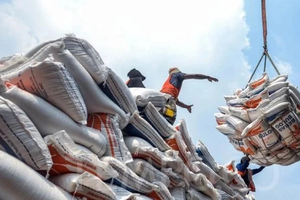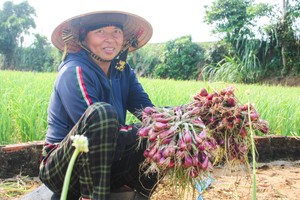
Deputy Minister of Industry and Trade Do Thang Hai informed that the continuous increase of fuel prices recently, along with psychological effects, has had a negative impact on prices of merchandise. Despite the drop of over VND3,000 (US$0.13) per liter of petrol, its price is still much higher than that in July 2021. This means it is nearly impossible for the charges of other products and services to come back to the old ones.
Therefore, one of the best solutions at present is to increase the supply of essential commodities to the market, avoiding local shortages.
Deputy Director General Nguyen Thuy Hien of the Planning Department (under the Planning and Trade Ministry) reported that the total domestic retail sales of goods and services in the first 6 months this year are higher than increase rate of this time three years ago – before the Covid-19 pandemic. It has reached VND2.72 million billion ($116 billion), a rise of 11.7 percent compared to this time last year, especially in the product groups of culture, education, and food. Some areas with a retail sales growth of over 10 percent are Ho Chi Minh City, Can Tho City, Hai Phong City, Binh Duong Province.
As to fuel, the Planning and Trade Ministry is going to strictly monitor its prices and domestic demands, fuel import progress for timely administration.
Deputy Prime Minister Le Minh Khai has just assigned this ministry to prepare a report about fuel tax reduction and to study similar measures for other products to aid individuals and businesses in the country.
Assoc. Prof. Dr. Nguyen Ba Minh, Head of the Institute of Economics and Finance, commented that there are many events in the world that can negatively affect the price of fuel, such as complicated status of the Covid-19 pandemic, the conflict between Russia and Ukraine. The good news is domestic agricultural output is quite high, resulting more stable food prices.
Economic expert Dr. Ngo Tri Ling proposed that the Finance Ministry actively predict possible factors that can influence inflation and prepare corresponding scenarios, measures to regulate prices. Simultaneously, it is necessary to monitor the global economy and inflation, the prices of fuel and strategic materials. Then respective solutions could be timely adopted to balance between domestic supply and demands for price stabilization.
Assoc. Prof. Dr. Dinh Trong Thinh from the Academy of Finance said that the Government should maintain the macroeconomic stability, control inflation, ensure major balances to make way for economic stability and eliminate anxiety among both citizens and businesses, which might be one cause of inflation. The State Bank of Vietnam should flexibly regulate interest rates, open market operation, exchange rates in accordance with the growth of the national economy so as to strengthen the VND and curb core inflation.
























